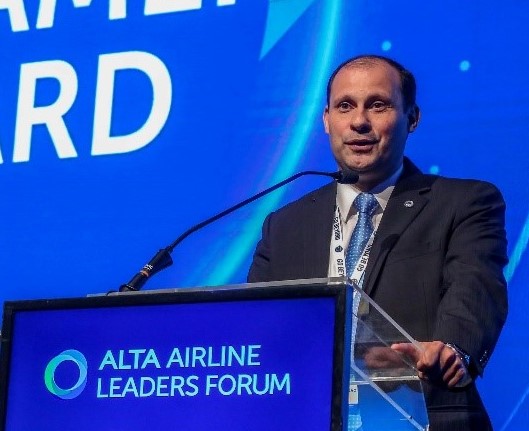Recovery as a Goal
By José Ricardo Botelho
We live in extraordinary times, which inevitably require extraordinary efforts. The team at the Latin American and Caribbean Air Transport Association (ALTA) is aware of this and therefore, since the beginning of the pandemic, our immediate priority has been to support our members to remain viable during this crisis and to collaborate with the authorities of the region, in the implementation of efficient and articulated mechanisms for the reactivation of air transport.
All the players in the aviation industry have worked day and night, to keep aviation alive, considering the great bridge between countries it represents. Maintaining this active link required the industry to adopt the ICAO CART document to establish secure protocols, which will be used to standardize procedures throughout the world. There we include ACI, IATA and the tourism sector, through the WTTC.
Now our biggest challenge is to contribute to the reactivation of the airline industry and to recover the growth it was experiencing prior to the pandemic.
2019 marked the sixteenth consecutive year of growth in passenger traffic in the region. Latin American aviation consolidated with a share of 8% of global aviation and, for 2020, growth of more than 5% was expected.
This mission requires, in the first place, to guarantee the sustainability of the companies in the sector, in addition to implementing effective health and safety protocols that facilitate the work of the sector and allow saving costs and increasing competitiveness.
We have already defined the path. The protocols exist. Its implementation in airports and in aircraft with HEPA filters -which change the internal air of the cabin every 3 minutes, while in a hospital the exchange is on average every 10 minutes- have shown that the risk of contagion is very low.
It is time to re-plant the seed of trust and to remind the world that the facts indicate that aviation is one of the safest means available today in terms of accident rates, even when we talk about the issue of biosecurity, as exposed.
We believe that allowing flights is the safest way to recover the economy which, by focusing on the well-being of travelers, guarantees jobs and the lives of millions of people.
Reactivating the operations of the industry means ensuring connectivity in the region and generating taxes for the benefit of all. Today more than ever before, the public and private sectors need to work together, promoting trust among travelers.
We believe that instead of extending regulatory measures that increase costs, uncertainties and fears, it is time to support and show everyone that aviation is safe and that its work can be done on the basis of scientific and proven measures. At this time, the key is to have harmonized and coordinated protocols. That is why we ensure that the protocols in the ICAO CART “Take Off” guide are adequate for a reopening without infection and that no additional measures are required, such as quarantines that do not generate trust in people.
After all, in many places where flights have stopped, land routes are being allowed (often without all the protocols and without all the technology available to aviation).
Paving the way for the commercial aviation industry to renew itself in Latin America and the Caribbean also requires changing many of our policies, as our region is marked by excessive regulations that make operations costly.
However, knowing that the recovery of passenger traffic in our countries could take about 5 years, we are working so that this time serves as a period dedicated to improving many aspects of regulations, prices of inputs and supplies, which increase transparency and a healthier competition within the sector.
Fortunately, the governments of the Latin American and Caribbean countries recognize the value of aviation and tourism as economic enhancers and generators of well-being and opportunities for the population. They are also aware that the continental geography demands air transport to offer the natural and cultural beauties of our region to all, which provide impressive opportunities for the development of tourism.
Recovery is the goal and it will be essential for the region to have airlines connecting the most important points, both from the tourist point of view and for business travel. In places like Mexico, Panama and other Caribbean countries, more than 15% of the economy depends directly on tourism and the vast majority of tourists who arrive there, do so by air.
For all these reasons, our industry will play a fundamental role in the reactivation of our countries. The adaptability of commercial aviation has proven to be an invaluable tool not only to boost tourism, but also to facilitate trade and supply chains for food, medicine and basic needs.
This is a perfect opportunity to establish solid bases, which guarantee a coordinated and articulated restart of air operations among all countries.
We are together in the work of growing the connectivity of Latin America and the Caribbean. Also in the task of protecting millions of sources of employment and promoting business opportunities, as well as improving the lives of those who inhabit a continent that still has so much to show and offer to the world.
José Ricardo Botelho, is Executive Director and CEO of the Latin American and Caribbean Air Transport Association (ALTA). A Law Graduate from the Catholic University of Salvador and with post-graduate studies at the Jorge Amado University and the National Police Academy of Brazil, he previously held other important positions as President of the National Aviation Agency and as Alternate Diplomatic Delegate of that same country, before the International Civil Aviation Organization (ICAO).

